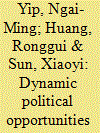| Srl | Item |
| 1 |
ID:
167490


|
|
|
|
|
| Summary/Abstract |
This study aims to investigate Weibo users’ political ideologies in China. It argues that a left-right spectrum cannot adequately depict the ideological landscape, and proposes a typological framework to guide the analysis of competing ideologies. Based on a sample of 3440 Weibo users, this article uses latent class model to identify sub-types of ideologues. It discerns five ideological groups, namely Maoists, regime defenders, full-fledged liberals, economic liberals, and political liberals, as well as one politically silent group. The results show that liberal leaning Weibo users are not a homogeneous group, and should not be holistically conceived as regime challengers in opposition to regime defenders. To a certain degree, economic liberals are more similar to regime defenders than Maoists, and this can be better understood from a typological perspective than a spectrum perspective. This article concludes with a discussion on the political implications of the findings.
|
|
|
|
|
|
|
|
|
|
|
|
|
|
|
|
| 2 |
ID:
153405


|
|
|
|
|
| Summary/Abstract |
While the literature on Chinese environmental politics tends to examine NGO actions and popular protests as two separate facets of environmental activism, such a tendency runs the risk of missing the linkages that have begun to emerge among environmental forces. This new phenomenon is highlighted with a case study of local opposition against the siting of an oil refining plant in Kunming through the lens of political opportunity theory. Two forms of linkages are identified, namely the linkages between local communities and local NGOs and the linkages between local and supra-local NGOs. These linkages emerged and developed through dynamic interactions between political opportunities and contentious actions. Citizen-initiated protests in Kunming pressured the local government to adopt a receptive attitude for the purpose of maintaining social stability, which paradoxically expanded political opportunities for NGO participation. The structural political environment of the locality indirectly facilitated collaboration between local and supra-local environmental NGOs by activating prior social networks among key NGO members. The analysis of the dynamic linkages among environmental forces reflects the prospects of a broader environmental movement and its relation to political contexts.
|
|
|
|
|
|
|
|
|
|
|
|
|
|
|
|